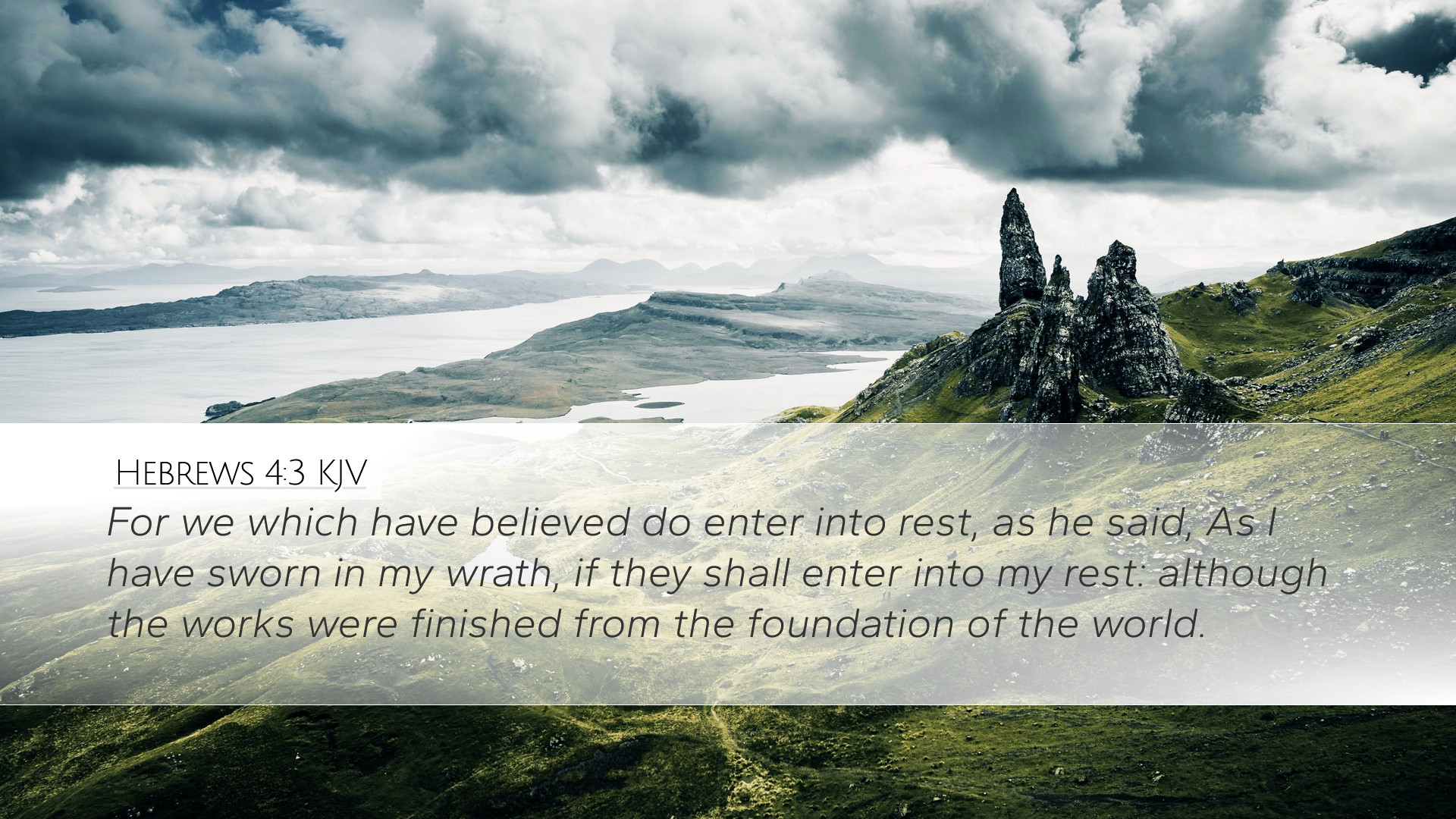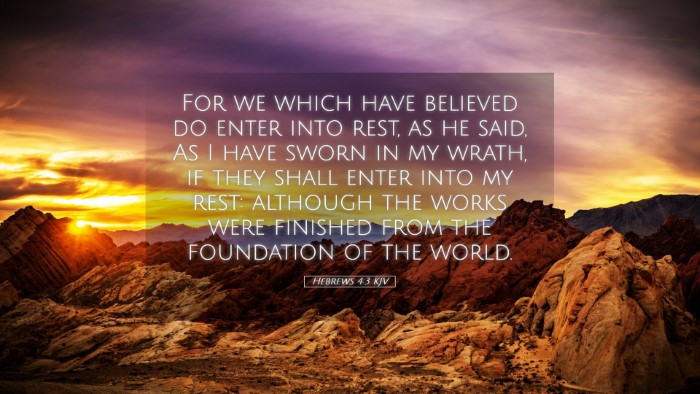Old Testament
Genesis Exodus Leviticus Numbers Deuteronomy Joshua Judges Ruth 1 Samuel 2 Samuel 1 Kings 2 Kings 1 Chronicles 2 Chronicles Ezra Nehemiah Esther Job Psalms Proverbs Ecclesiastes Song of Solomon Isaiah Jeremiah Lamentations Ezekiel Daniel Hosea Joel Amos Obadiah Jonah Micah Nahum Habakkuk Zephaniah Haggai Zechariah MalachiHebrews 4:3
Hebrews 4:3 KJV
For we which have believed do enter into rest, as he said, As I have sworn in my wrath, if they shall enter into my rest: although the works were finished from the foundation of the world.
Hebrews 4:3 Bible Commentary
Commentary on Hebrews 4:3
Verse Text: "For we who have believed enter that rest, as he has said, 'As I swore in my wrath, they shall not enter my rest,' although his works were finished from the foundation of the world."
Introduction
The passage in Hebrews 4:3 underscores a significant theological concept: the rest that God promises is available for those who believe. This rest is not merely physical, but spiritual, relating to the deeper experience of salvation and grace. The commentary below synthesizes thoughts from respected public domain commentaries to shed light on the profound implications of this verse.
The Nature of God’s Rest
Matthew Henry highlights that God's rest is a state of perfect satisfaction and peace, reflecting God's own rest after creation. This rest implies not just cessation from work but a fulfillment of purpose and promise. The biblical reference to God’s rest draws attention to the original act of creation, reminding believers that resting in Him is entering into His completed works.
The Connection of Faith and Rest
Albert Barnes emphasizes the conditional nature of entering God’s rest: it is reserved for those who believe. Belief is not a one-time event but a continual reliance on God's promises. This thematic tie between faith and the experience of rest suggests that spiritual rest is only accessible through a relationship with Christ, who invites believers to lay down their burdens at His feet.
Historical Context and Warning
Adam Clarke reminds us of the historical context surrounding this verse, noting that the warning echoes the experiences of the Israelites in the wilderness who failed to enter the Promised Land due to disbelief. The writer of Hebrews utilizes this historical reference to illustrate the precariousness of the believer's status; if they do not firmly hold onto their faith, they may miss out on the rest that God offers.
Spiritual Implications
- Completion of God's Works: The phrase "his works were finished from the foundation of the world" indicates God's sovereignty and foreknowledge. It reassures believers that God’s plans for salvation were laid out from the very beginning.
- Belief as Key to Rest: The commentary evaluates how belief is the prerequisite for entering into God's rest. This belief necessitates a spiritual understanding and acceptance of Christ's finished work on the cross.
- Rest as a Spiritual State: The rest mentioned here is portrayed as a life of peace and fulfillment rather than merely the absence of physical toil. This reflects on the current spiritual state that believers can experience in Christ.
The Eschatological Dimensions of Rest
The authors remind us that the concept of rest also carries eschatological implications, pointing toward the ultimate rest believers will experience in eternity with God. Henry notes that while the current rest is available, it is a foreshadowing of the eternal rest to come, thereby linking present faith to future hope.
Practical Applications for Believers
In light of this verse, pastors and theologians must guide congregations to understand the importance of actively entering into God's rest through faith. Believers are encouraged to reflect on their relationship with God, ensuring they are resting in His promises and not striving in their own strength.
- Encouragement to Reflect: Take time for personal introspection regarding one's faith. Are you truly resting in God’s promises?
- Commitment to Trust: Strive to trust God fully, especially in times of uncertainty.
- Sharing the Message: Encourage others to enter into this rest by sharing the message of hope found in Christ.
Conclusion
Hebrews 4:3 offers profound insights into the nature of God’s rest and the believer’s path to enter it. By intertwining theological reflection and practical application, this commentary allows pastors, students, and scholars to delve deeper into the rich tapestry of faith that sustains the church and individual believers alike.


